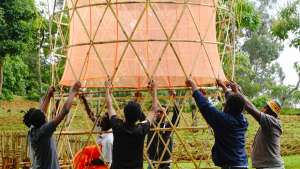From the Series
In June 2015 the online platform Where Love Is Illegal was launched to provide LGBTI communities with a space to share stories of discrimination and survival. Individuals are encouraged to share their moving, personal accounts alongside images and portraits.
Through highly visual storytelling, the site hopes to transform opinions, open minds and eventually change policies.
“Bigotry thrives where fear causes us to be silent,” says founder Robin Hammond, an award-winning human rights photographer.
Today there are still 76 countries where same-sex relationships are illegal, and five in which they are punishable by death. Where Love Is Illegal has shared stories from people living in Uganda, Nigeria, South Africa, Syria and Russia in the hopes of bringing to light the laws that discriminate against people and the social injustices that LGBTI communities are forced to live with every day. It is a platform, says Hammond, where the voices of the LGBTI communities can be heard louder than those who speak out against them.
The idea for the project began when Hammond was in Nigeria in mid-2014 and met a group of five young men who had been arrested and flogged for being gay. Homeless and in hiding, Hammond was struck by how afraid and uncertain these men were. A few weeks later Hammond returned, took portraits of the five men and recorded their stories. With these images he applied for a Getty Grant for Good, and less than a year later Where Love Is Illegal was launched.
Hammond strongly believes in the power of photography to create an instant, emotional connection to the subject. It was important to him that each person’s story was told in a way they felt comfortable with. Many of the subjects hide their faces to protect their identities, and all were given veto power over images they felt put their safety at risk. Alongside each photo is an unedited statement, published exactly as the subject wrote them. They are testimonies of the discrimination they suffered and the courage they displayed.
The images are shared on the Where Love Is Illegal website as well as on Instagram, Facebook and Twitter with the call for others to join in the conversation.
Witness Change, the organisation behind the platform, is a non-profit started by Hammond that raises money to support on-the-ground organisations working to promote human rights. Where Love Is Illegal is raising money to support three grass roots organisations:
Hope Alive Initiative, a voluntary group that offers support to LGBTI communities in northeastern Nigeria. Funds raised will be used to build an office, a safe house, and provide condoms to clients.
Kuchu Times, a Ugandan LGBTI publishing house that aim to combat the spread of intolerance through the Ugandan media. In late 2014 Kuchu Times printed a 72-page magazine called Bombastic and will use funds to print additional copies for distribution and to create an international magazine in collaboration with Witness Change that offers LGBTI communities more chance to share their stories.
PASSOP in South Africa offers support and assistance to refugees. South Africa is the only African country accepting asylum pleas based on persecution against sexual minorities. However, there systems are often inefficient and many are still turned away. PASSOP offers assistance with legal advice and documentation and helps raise awareness of the difficulties faced by LGBTI refugees.





















